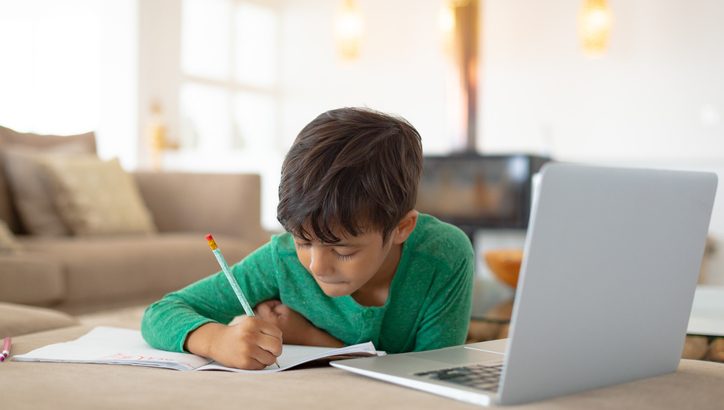The View
Between this week and next, schools across the country are due to reopen. Parents will be sending their children back to a school building for the first time since March, but this September many will be wearing a new uniform: a face mask. Children will be told to keep their distance from their friends, to avoid contact or touching books or other items others may have touched. Now add in the likelihood of interruption in continuity of tuition, due to requirements for teachers to self-isolate. If you think that this is a stressful environment in which to expect children to learn efficiently, you’d be right.
We were initially told by the former Taoiseach, Leo Varadkar, that the imposition of lockdown was to “flatten the curve”. The mathematical difficulty this presents is that if you flatten the curve, you also lengthen it. Some time ago, I wrote an article on home-schooling during the lockdown. I said that a few weeks or even a couple of months out of school was not going to seriously disadvantage a child. I still hold to that view. But if the disruption of a child’s education continues during this year and even into the next – particularly for secondary school students – it will begin to affect a child’s chances and potential.
Opportunity
The lockdown period provided an unlooked-for opportunity for many parents, who might otherwise never have contemplated it, to give home-schooling a try. Given the continued uncertainty regarding the return to ‘outside’ school, some may now be considering continuing the experiment. If this is you or someone you know, here are some things you might like to know.
The right to home-school – or educate your child outside a recognised school – is a constitutional right in Ireland. Article 42 of Bunreacht na hÉireann acknowledges the family as the primary and natural educator of the child and guarantees to respect the inalienable right and duty of parents to provide for the education of their children. It further provides that parents shall be free to provide this education in their homes.
Article 42.3.2 provides that the “State shall, however, as guardian of the common good, require in view of actual conditions that the children receive a certain minimum education, moral, intellectual and social”. For that reason, if you decide to home-school and your child is between the ages of six and 16, you must register your intention with Tusla, the Child and Family Agency. An application form is available on their website.
You will have to speak with an assessor from Tusla and describe the education you are providing to your children. So long as you can show that you are providing a “certain minimum education”, the State has no further right to intrude upon your efforts.
One of the great draws of home-schooling is the ability to create your own curriculum; you are not tied to the school or State curriculum. This brings a certain freedom for students who may be interested in different areas of learning, and might otherwise be limited to the subjects on offer in any particular school. Some home-schooling families opt to follow a planned curriculum; there are many available, such as the Mother of Divine Grace School. Others prefer a less structured approach where they follow the children’s interests; a hybrid approach can also be used.
For those at secondary level, this flexibility also means that you have much greater choice when it comes to a final school exam. Other opportunities open up: instead of being bound to the leaving certificate, the A-levels, American SATs, or international baccalaureate are all options. Of course, some students might prefer to do vocational courses and can do so without ever having to sit an end-of-school exam.
Some people home-school because their children have special needs”
The home-schooling community in Ireland is a broad church and people home-school for many different reasons. Some educate their children at home for lifestyle reasons, some are bohemian, some want more flexibility in their family schedule. Others do it for philosophical and educational reasons, wanting to escape the ‘one-size-fits-all’ approach of the schooling system, or preferring an alternative educational approach. Some home-school because their children have special needs, or find that their children’s talents or needs are not adequately catered for in the school system. Others do so for religious and moral reasons. Some may now do so due to Covid-19.
Whatever the reason, it is important to find support among other home-schooling families, if possible. Home-schooling can be an isolating experience, and if you’re going to stay the course, you’ll need support. Ask around your parish to find out if there are other home-schoolers in your locality.
In addition to the many advantages of home-schooling, an added bonus in these times is that your child gets to learn in the comfort and safety of his or her own home, without being troubled by wearing a mask all day or having to studiously avoid touching surfaces that others might already have touched. If we really want our children to learn well in comfortable learning environments, this is a not insignificant factor in their daily lives.
Some may say that they would like to home-school but cannot. Although home-schooling families come from all kinds of different socio-economic backgrounds, the truth is that the education of children in the home receives no State support, unlike education in schools. Given the times in which we live, with job losses and great uncertainty around the school system, and given the Constitution’s statement that the “State shall provide for free primary education and shall endeavour to supplement and give reasonable aid to private and corporate educational initiative…with due regard, however, for the rights of parents, especially in the matter of religious and moral formation”, perhaps it’s time that home-schooling families let the Government know that our children deserve better.
Children from low income families attending schools enjoy State support in relation to the purchase of school-books, clothing and footwear and assistive technology for students with disabilities. School children also enjoy health screening for hearing, eyesight and dental problems. The same should apply to home-schooled children. An even more significant contribution would be the abolition of tax individualisation, which penalises families where one parent foregoes a salary by remaining in the home. For the State to make good on its Constitutional promises, parents who take their children’s education upon themselves should be supported, not discouraged.


 Maria Steen
Maria Steen
